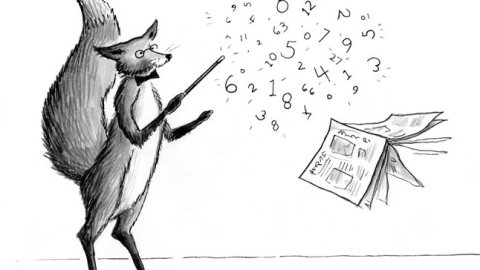Nerdier News And Plato’s Math Error

The new nerdier news has arrived. But can its nerd tools, honed in the “olicausal sciences” (oli = few), handle the greater complexities of journalism? Steven Pinker says, “No sane thinker would try to explain World War I in the language of physics.” Many of life’s patterns remain beyond “the numbers.”
Data-wizard Nate Silver thinks “statistical tests to look for relationships in the data” give his “data journalists” an advantage in analysis and explanation. But statistics (math’s magic recipe for taming uncertainty) is a slippery nerd tool. Many expert researchers don’t understand the statistics they use. And their data often contain statistical errors: “More than half of 314 articles on neuroscience in elite journals…failed to” use statistics properly. And “statistical significance” neither ensures real-world importance, nor is it always the proper standard. As a critic of a Silver-published piece on climate change noted, sometimes we shouldn’t wait till an effect rises to 95% confidence.
In “The Median Isn’t The Message,” Stephen J Gould says when told his cancer was “incurable, with a median mortality of eight months after discovery,” he knew, unlike the untrained, that didn’t necessarily mean he’d “probably be dead in eight months.” He lived another 20 years, because his particulars weren’t well represented by those general statistics.
The patterns of relationships between the particular and the general are easier in ,say, physics, where the relevant properties of elements and their contexts are quite stable. But people aren’t biological billiard balls, and life’s contexts are more complex. Most nerd tools were developed for deterministic situations: nothing in physics has options or can innovate. Capacities for choosing and changing subvert the stability of trends in social sciences and journalism (thereby clouding nerdy crystal balls).
Isaiah Berlin (source of Silver’s fox vs. hedgehog metaphor) explains “because” is used differently in science and history (and journalism is history’s first draft). In science, because means reliably causal, but in history it means a looser, narrative kind of causation, a useful explanation of the complex web of factors affecting a particular situation. In polycausal contexts quantification makes “the spice error” tempting: Small factors aren’t always unimportant (many sauces need tiny amounts of spices).
What you are doing right now illustrates the limits of math. Can any of these sentences be captured mathematically or statistically? Represented, yes. Understood, no. Whatever numbers are mapped to letters, words, phrases, or concepts, they can’t be number-crunched to yield meaning. Language remains unconquered by math.
The idea of all-conquering math comes from Plato’s belief in a mathematically harmonious universe. While Plato worshiped universal abstract mathematical knowledge, Aristotle sought practical wisdom in particular contexts (this mirrors differences between the Newton pattern vs the Darwin pattern). The truly wise know which to use when.
The magic of data wizards can surely add much to “traditional journalism.” But until Plato’s faith triumphs, we’d better not defer too readily to “the numbers.” Their spell isn’t universal. Perhaps they’re best used as spice.
Illustration by Julia Suits, The New Yorker Cartoonist & author of The Extraordinary Catalog of Peculiar Inventions.





